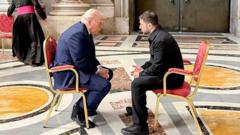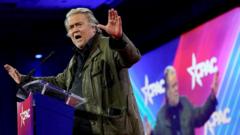The discussions are seen as a pivotal moment for both nations, with renewed hopes hanging in the balance as former President Donald Trump suggests compromise on Crimea, stirring controversy among allies.
Critical Week Ahead for Ukraine-Russia Negotiations, Rubio Warns

Critical Week Ahead for Ukraine-Russia Negotiations, Rubio Warns
US Secretary of State Marco Rubio emphasizes the importance of the upcoming week in determining the future of peace talks between Ukraine and Russia.
In a critical assessment of the ongoing negotiations regarding the Ukraine-Russia conflict, US Secretary of State Marco Rubio has emphasized that this week will be decisive in shaping the future diplomatic efforts. He stated that Washington is currently evaluating its level of involvement in the ongoing war, which has now entered its second year.
Rubio also pointed out that ex-President Donald Trump has refrained from implementing new sanctions against Russia, based on a belief that diplomatic solutions might bring about an end to hostilities. Over the weekend, Trump had a brief meeting with Ukrainian President Volodymyr Zelensky at the Vatican and hinted that he believed Zelensky might be prepared to concede Crimea as part of any potential peace agreement. This statement stands in stark contrast to Ukraine's long-held position against territorial concessions.
In an appearance on NBC's "Meet the Press," Rubio stated, "There are reasons to be optimistic, but we must remain realistic. We are close, but not close enough." He underscored the importance of discerning genuine intentions from both parties as discussions evolve. Furthermore, Rubio cautioned that imposing penalties on Russia could derail the peace process.
Trump's latest comments have led to controversy, as he continuing to question whether Russian President Putin genuinely desires to halt the conflict. He expressed concern over the ongoing violence, highlighting the struggles of those affected by the war.
Despite Trump’s claim that Zelensky appeared calmer during their meeting compared to earlier tensions between the two leaders, the Ukrainian side has consistently rejected the idea of territorial compromises until a ceasefire is in place.
In light of these developments, German Defense Minister Boris Pistorius advised against Ukraine agreeing to any terms involving extensive territorial losses in exchange for a ceasefire, asserting that a capitulation would neither bring value nor improve Kyiv’s situation.
While Trump stated that significant components of a peace deal had been tentatively agreed upon, the details remain unclear. Reports indicate potential proposals allowing for US legal acknowledgment of Russia's annexations, alongside guarantees from NATO and other countries. Yet, European and Ukrainian counter-proposals insist that discussions about occupied territories should be postponed until a ceasefire emerges.
Amidst these complex negotiations, the US has signaled its willingness to withdraw from talks if progress is not achieved. Moscow continues to hold nearly 20% of Ukrainian territory, emphasizing the urgent need for a satisfactory resolution to the ongoing conflict.
Rubio also pointed out that ex-President Donald Trump has refrained from implementing new sanctions against Russia, based on a belief that diplomatic solutions might bring about an end to hostilities. Over the weekend, Trump had a brief meeting with Ukrainian President Volodymyr Zelensky at the Vatican and hinted that he believed Zelensky might be prepared to concede Crimea as part of any potential peace agreement. This statement stands in stark contrast to Ukraine's long-held position against territorial concessions.
In an appearance on NBC's "Meet the Press," Rubio stated, "There are reasons to be optimistic, but we must remain realistic. We are close, but not close enough." He underscored the importance of discerning genuine intentions from both parties as discussions evolve. Furthermore, Rubio cautioned that imposing penalties on Russia could derail the peace process.
Trump's latest comments have led to controversy, as he continuing to question whether Russian President Putin genuinely desires to halt the conflict. He expressed concern over the ongoing violence, highlighting the struggles of those affected by the war.
Despite Trump’s claim that Zelensky appeared calmer during their meeting compared to earlier tensions between the two leaders, the Ukrainian side has consistently rejected the idea of territorial compromises until a ceasefire is in place.
In light of these developments, German Defense Minister Boris Pistorius advised against Ukraine agreeing to any terms involving extensive territorial losses in exchange for a ceasefire, asserting that a capitulation would neither bring value nor improve Kyiv’s situation.
While Trump stated that significant components of a peace deal had been tentatively agreed upon, the details remain unclear. Reports indicate potential proposals allowing for US legal acknowledgment of Russia's annexations, alongside guarantees from NATO and other countries. Yet, European and Ukrainian counter-proposals insist that discussions about occupied territories should be postponed until a ceasefire emerges.
Amidst these complex negotiations, the US has signaled its willingness to withdraw from talks if progress is not achieved. Moscow continues to hold nearly 20% of Ukrainian territory, emphasizing the urgent need for a satisfactory resolution to the ongoing conflict.




















